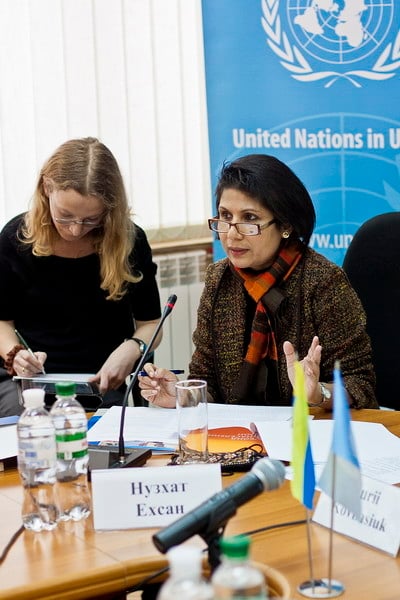4 March 2013, Kyiv – on the occasion of the International Women’s Day, Ukrainian and international experts discussed key issues concerning equality between women and men during a Round Table co-organised by the National Academy of Public Administration under the President of Ukraine and the United Nations in Ukraine.
The United Nations emphasises that advancing gender equality and empowering women is critical for achieving peace and security, human rights protection, and sustainable economic and social development.
“Although Ukraine is signatory to all international conventions and initiatives for achieving gender equality and has a number of relevant laws, gender equality is far from being a reality in Ukraine”, said Ms. Nuzhat Ehsan, Chair of the UN Gender Working Group, UN Fund for Population Activities Representative for Ukraine. “Women make less than 10 percent in Ukraine’s newly elected Parliament, which makes the political culture in Ukraine male-dominated and leaves the country lagging behind European standards in this field”.
«Ukrainian women constitute 54% of the population of Ukraine, they are usually better qualified than men but they earn only 70% of the salary of men in equal positions”, Ms. Ehsan added and mentioned other problems Ukrainian women suffer from – widespread gender stereotypes on the role of a man and a woman in a family, violence against women and girls, and a growing share of elderly women.
Addressing the Round Table participants, Ms. Ella Libanova, Director, M.V. Ptukha Institute for Demography and Social Studies, NAS of Ukraine, pointed out: although according to statistics it is women who experience discrimination, men also suffer for men’s average life expectancy in Ukraine is 12 years shorter. “A main barrier on the road to gender equality consists of mentality of both men and women. To change the situation, women must feel the desire of achieving a high position in society rather than being a ‘man’s loyal friend’”, Ms. Libanova said.
Answering the question on “Why there are so few Nobel laureates among women?”, Ms. Larysa Kobelianska, Deputy Vice President, National Academy of Public Administration under the President of Ukraine, made a short excursion into the history of the Ukrainian women’s movement and pointed out that women had obtained a possibility of acquiring higher education only in the late 19th century and had started taking active part in societal life during the recent 100 years.
Ms. Halyna Zhukovska, Director, Gender Policy Department, Ministry of Social Policy of Ukraine, voiced the hope that approval of the State Programme for Ensuring Equality between Women and Men for 2013-2016 would let Ukraine make a great step in achieving equal rights for women and men.
Mr. Mykhailo Koryukalov, Project Manager, EU Project “Back to work: reintegration of parents to professional life after the parental leave”, said: “The gender equality problem can be viewed on many levels – national, educational, and family. In a family it is easiest of all to implement new standards of labour division between men and women and to follow results. For example, if the father begins to spend more time with his child then the mother obtains an opportunity to work and does not lose her skills, which means greater income for the family”.
Considering possible solutions to gender equality problems, Mr. Yurii Kovbasiuk, President, National Academy of Public Administration under the President of Ukraine, stated that implementation of gender-based approaches in all areas of the society’s vital activities should be achieved not only by encouraging employers to introduce European standards of employee equality in the world of work but also by teaching public administration experts on gender matters, implementing gender-based approaches in the education system, training civil servants and local government officials, holding communicative events involving mass media, higher educational institutions, officials and the public in order to prevent shaping of stereotyped ideas about the role of a woman and a man.


